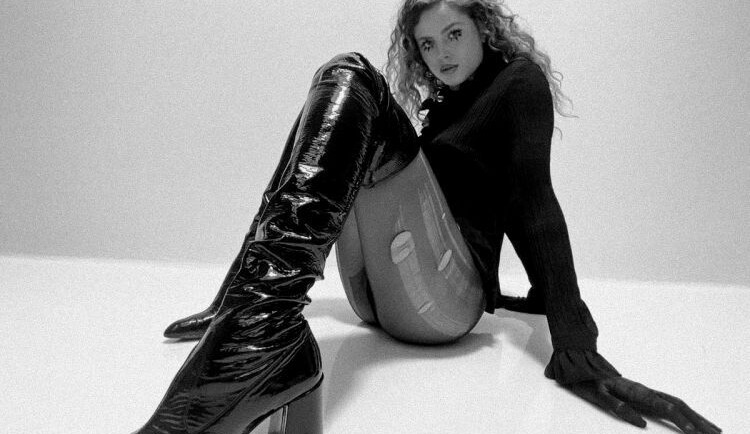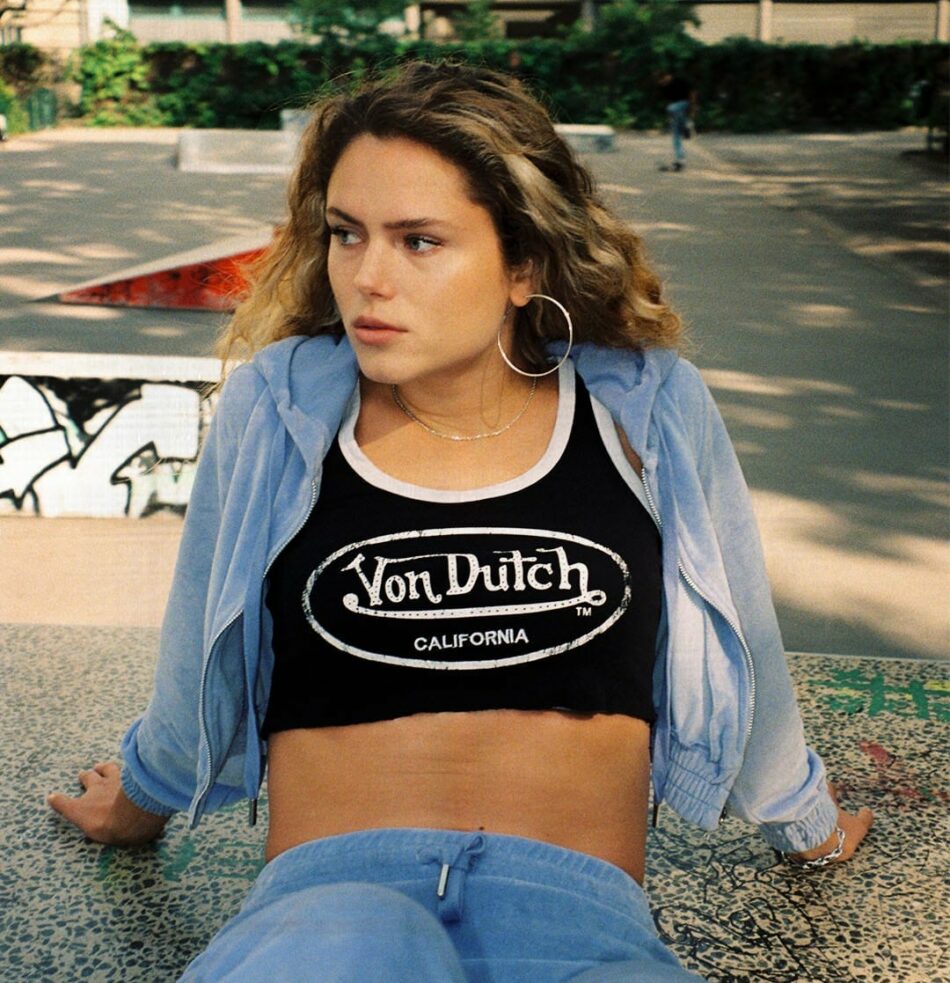
Eli Preiss’s third album in three years, b.a.d., is a portrait of a generation growing up with ADHD, PTSD, Deutschrap and lots of drugs.
The song “Was ist der Prei$$” is about Prada and worthless things. How materialistic are you?
Eli Preiss: Compared to other, similarly successful people in my branch – hardly at all. Compared to other college students – very. The track is also inspired by my favorite movie, Spirited Away – gluttony turns her parents into pigs; the greed of the character “No Face” makes it eat everyone who takes its money…starting from that, I made the video concept for the track and developed it with my best friend Vlad [Dobre]. The album ended up with a black-and-blue color scheme again, like F.E.L.T. two years ago. That stood for ‘fragments of a lucid dream’ [‘Fragmente Eines Luziden Traums’], which now rhymes with ‘b.a.d.’, ‘Bewusstseins Aufbauende Downs’ [‘consciousness-building downs’]. I put a lot of thought into it. [laughs]
The single “Wein in Wien” [“Wine in Vienna”] is almost drum’n’bass.
Eli Press: Yes, it’s about my first nights out in Flex and Fluc. [laughs] The producer of that track, prod.suki, really lives drum’n’bass. I think nowadays you have to have some variety in Deutschrap. Donna Savage, Verifiziert, and Pashanim have all rapped over beats that weren’t classic rap beats.
“We all feel a little lost.”
Gen Z is said to be dissatisfied, immature, disoriented, unconcentrated and undependable. Is that the way your generation really is?
Eli Preiss: It’s true of the people I know. I really wanted to describe that feeling from the gut, and give it a nice little touch of drama. We all feel a little lost; we all struggle with self-doubt. I think it’s good that people are talking about it, that they know more about their psyche.
You also talk about mood swings.
Eli Preiss: When I’m having a phase like that, I forget that it’s a phase. I feel like that’s the way my personality is always going to be now – I’ve got it tough; I’ll never be happy again. And then sometimes I text ten friends about it, and then it’s embarrassing if I’m in a great mood and dancing around the next day.
Still, the album title, b.a.d., suggests that you learn a lot from those phases.
Eli Preiss: Definitely. I’ve learned to love my strong emotions. Some people probably have to take drugs to feel that much.
How easy is it to get drugs these days?
Eli Preiss: [laughs] There’s this great song by 070 Shake, where she says: “When you’re livin’ in a scene where the healthy shit is far / but the drugs are no further than your room or your car.” In my scene, it’s incredibly easy. It’s harder to get rid of them, to say “no thanks, get away from me with that stuff.” I learned a lot about it studying philosophy: some people say that if you only pursue the things you want to do, you become an animal. I try to take breaks, where I stay clean and get my head straight.
“Everything’s a little chaotic.”
What did you like so much about the book Your Head is a Houseboat?
Eli Preiss: Campbell Walker is actually an illustrator; he’s been through a lot. He describes psychological processes in the book, in a really interesting and amusing way: he compares your head with a houseboat; everything’s a little chaotic and there are different rooms that you have to clean up on a regular basis. The book has some different methods of getting your head free; for example, writing a stream of thoughts down on paper, regardless of how nonsensical they are.

How did you get into music?
Eli Preiss: When I was in high school in Vienna, I played guitar and sang in the choir. I’ve lived here since I was eleven. I was born on Cyprus, grew up in Carinthia, and was often in Bulgaria visiting relatives. When I was a teenager I played in a band there; we were influenced by Tame Impala and the Arctic Monkeys. It wasn’t the right thing for my voice, but I was set on expressing myself. But then I realized that all the different opinions in a band were too much for me.
What led to your first tracks?
Eli Preiss: A friend told me that she had posted an Instagram story where she asked who wanted to work with her, and I just did the same thing. That’s how I met Kareem Pfeiffer and Moritz Schnürl; I made my first songs with them. Since then, a lot of doors have opened up for me. It sounds weird, but I feel like the universe is trying to say, “here’s a little something to help you continue on your way with music.”
Do you get identified as a Vienna musician?Eli Preiss: In Bulgaria, people notice I speak with an accent. In Vienna, a lot of people ask if I’m German, and in Germany everyone knows I’m from Austria. Somebody asked, about “Wein in Wien”, if I’m even Viennese; I said I’ve been here for thirteen years, and then they said, so you’re not Viennese! You can’t please everyone. I think I just wanted my mother to understand when she was around, that’s why I almost never speak in dialect. Rin’s performance at the Frauenfeld Festival in 2017 showed me that German-language music can also have style and be emotional. That’s what made me want to make music in German.
“My mom is my toughest critic.”
How do you go about making music?
Eli Preiss: Usually I meet producers and we work together. I might have rapped over a finished beat once, but otherwise it was always symbiotic. When I’m making tracks I try not to go about it too analytically, because it ends up sounding too forced or tense. I write a lot on my phone and then memorize the lyrics for the recording, so I can close my eyes and not have to look at a screen. Sometimes I have writer’s block, and that’s OK. Sometimes I just don’t have a story to tell, and then I look for inspiration in everyday life, in films, books, or conversations. I ask my manager Max [Matschnig] – he brought me into Universal – for his opinion, or my girlfriends, or my people at Swift Circle. My mom is my toughest critic.
There aren’t too many people that switch between singing and rapping the way you do.
Eli Preiss: I used to say I didn’t have any role models, because there were some things I wasn’t aware of. But now I can say I love Souly above all, and Ace Tee is really good.
Do lyrics have to rhyme or be true?
Eli Preiss: If the message is cool, if it vibes, I’d rather use the same word twice instead of double- or triple-rhyming. I know, old-school people don’t like me for that. But to me it’s important that it feel good and that people can identify with it. It doesn’t have to be true, but it does have to communicate a true feeling.
“As a woman in Deutschrap, you sometimes feel like an object.”
The things [you talk about] on “CYP:HER”, with the WDR Orchestra – when you were 16, one of your favorite rappers invited you to his house; when you were 17, a label guy suggested sex instead of percentage points, and when you were 18 someone said you’d only make it if you’re half-naked – did all that happen to you personally?
Eli Preiss: Yes.
On “Glühheiße Wüste”, you describe a toxic subculture.
Eli Preiss: I wanted so much to say the right thing with every word. I changed the lyrics over and over again and even went into the studio a second time, because the message is so hard. Almost every line is a punchline. I got really upset about some asshole who said everyone knows what ‘services’ Gola Gianni got for doing the feature with me. Like my music isn’t good enough. I had to let off some steam. As a woman in this deutschrap bubble, you sometimes feel like an object – and it’s not just the dudes.
What did #deutschrapmetoo change?
Eli Preiss: It was important that it went viral, that it got people talking. I think it made some rappers start checking girls’ ID and asking if it’s what they really want.
“These Days, a song has to be more streamlined.”
What good is a major label?
Eli Preiss: The people there give me information that I didn’t have before. They teach me strategy – when I should post or when it’s the right time for certain tracks. And they arrange collaborations, buy advertising, do PR work and help with promotion. More than anything, they’ve got money for videos – I’ve always had crazy ideas about videos, and I’ve really been able to go wild. But I have to say, I’ve also heard about people getting songs refused. And I think it’s sad that it’s hard to get on playlists as an independent. Although there are exceptions like T-Low, who’s never had a record contract.
Short tracks, or a hook at the beginning of the track – is that the strategy?
Eli Preiss: Not at all. I’m just influenced by my time. A lot of people do it that way. Sure, when I was a kid, hooks got repeated 30 times. Bro, if you drank every time the hook from “Dilemma” came, you’d be wasted. It just got fake-extended for radio. These days, a song has to be more streamlined, otherwise it’s boring. Besides that, though, I try not to be influenced by it.
How much do you charge for 16 bars?
Eli Preiss: [laughs] I don’t sell features. Never will.
How did the collab with Makko happen?
Eli Preiss: The boys were on the terrace on the Wien River one day. Bibiza had the connection first; I got to know the Boloboys through him. It was love at first sight; we just vibed instantly, and from then on, my life was never the same again. They really changed some things. [laughs]
“That’s still a stereotype, that women don’t write their own lyrics.”
What do you want to change, like in the lyrics to “Nimmasatt”?
Eli Preiss: Actually, I’m doing it already. Just by being a female rapper from Vienna. I would have liked to have role models, and hopefully I’m that for other people. I do a lot myself, and I’m glad to have my team supporting me. And I write my own lyrics. That’s still a stereotype, that women don’t write their own lyrics.
And what does that have to do with the legendary Schillerplatz concert?
Eli Preiss: That was in the lockdown, we at Swift Circle had no concept; we just wanted to do a benefit at the statue. We were surprised how quickly the plaza filled up. And Pat said we should get up on his car, use that as a stage. It had a ton of dents afterwards, but it was so legendary. The second year it was a little more professional, and this year we got a letter from the president and collected 20,000 euros for the earthquake victims in Turkey, Syria and Kurdistan. We’re going to try to keep it going.
Stefan Niederwieser.
Translated from the German original by Philip Yaeger.
